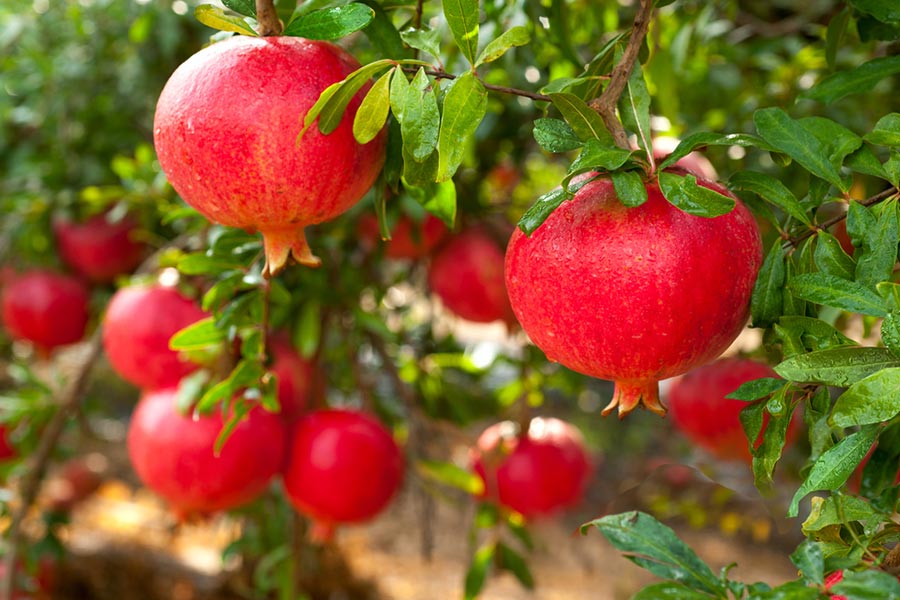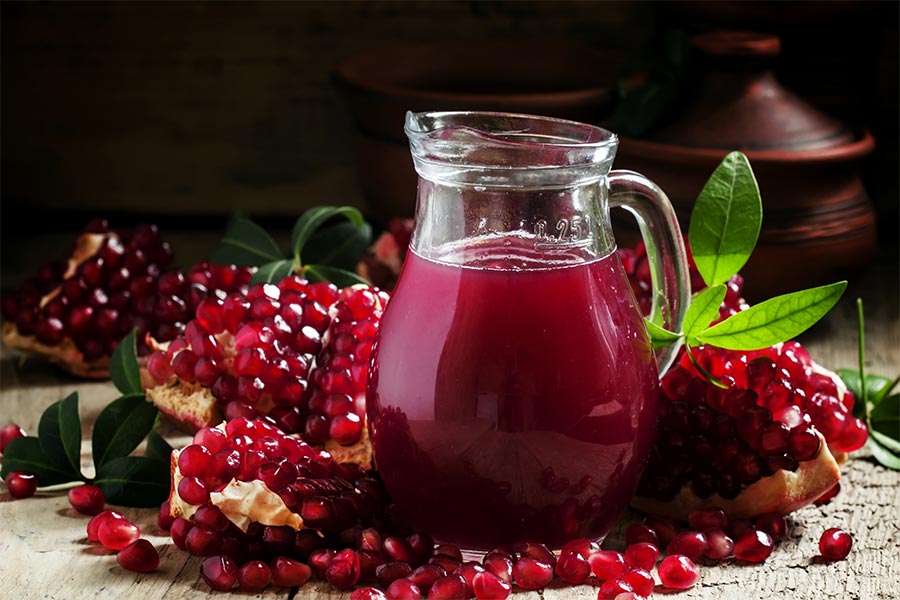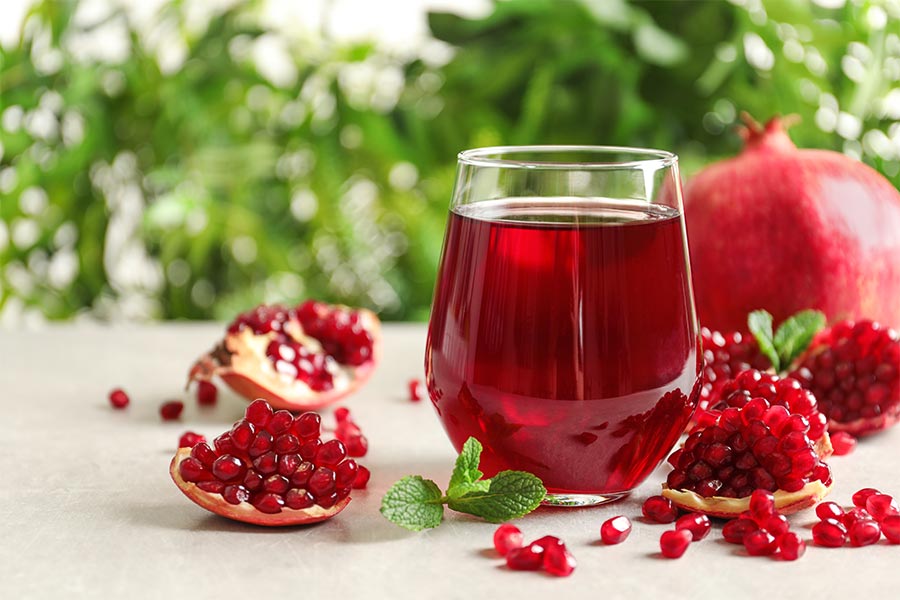Widely known as the ‘seeds of hope’, pomegranate with its vivid burgundy seeds and refreshing sweet tangy flavour is a medicine on its own. The nutrient-dense fruit has a long history to boast of. For the ancient Greeks, the pomegranate tree sprang from the blood of Dionysus, the god of wine; for the French, it was ‘grenade’ due to its distinct shape; and for the Chinese, the crimson fruit has been a symbol of fertility and called as the Chinese apple.
Native from Iran to the Himalayas in northern India and cultivated since ancient times throughout the Mediterranean region of Asia, Africa and Europe, the pomegranates spread to the Americas, and are considered an exotic fruit in the US.
Used as a condiment to cut the fats and oils in certain foods as well as for seasoning and garnishing, this ancient fruit from the Punica granatum tree still continues to be a colourful part of the cooking of the Middle East, India and the Caucasus.
From long ago, not only were they used as edible fruits, but also their juice was used to make wine and its roots and skin for remedies. During the Middle Ages, the use of pomegranates was thought to be good for liver inflammation. As such, researchers have confirmed that these red ruby arils are packed with nutrients essential for many diseases and ailments. Read on to know how pomegranate is good for your health.

Prevents heart disease
Pomegranate is a source of potent antioxidants such as tannins and anthocyanins, which have the ability to remove cholesterol from cells. Pomegranate is matchless in comparison to other antioxidants in protecting ‘the bad cholesterol’ (the low-density lipoprotein) and ‘the good cholesterol’ (high-density lipoprotein) from oxidation, and as a result, it reduces the thickening or hardening of the arteries caused by a buildup of plaque in the inner lining of an artery. Studies have shown that the juice of the pomegranate improves blood flow and keeps the arteries from becoming stiff and thick.
Lowers cancer risk
Pomegranate juice contains a high level of antioxidants than other fruit juices or even green tea. The antioxidants in pomegranate juice can help remove free radicals, protect cells from damage, and reduce inflammation. The anti-inflammatory properties of pomegranates may help reduce the risk of developing cancer.
According to clinical trials, the use of pomegranates has been shown to reduce existing cancer cell growth, induce cell death, prevent blood supply to tumours, and inhibit the spread of cancer cells in the body. Pomegranate extracts made from juice, rind, and oil slow down the reproduction of cancer cells and end them. Most studies have focused on breast, prostate, and colon cancer cells.

Alleviates arthritis
Flavonols in pomegranate juice may help block the inflammation that contributes to osteoarthritis and cartilage damage. The juice is currently being studied for its potential effects on osteoporosis, rheumatoid arthritis, and other types of arthritis and joint inflammation.
A study in 2011 showed that pomegranate extract decreased joint tenderness in rheumatoid arthritis patients by 62 per cent. The antioxidant properties of pomegranates may help to allay symptoms. It is also found that pomegranate extract can reduce biomarkers of the condition and oxidative stress.
Reduces ulcers
Pomegranate juice is best to reduce inflammation in the gut to improve your digestion. It can soothe your tummy during indigestion because it helps in the secretion of enzymes, which aids proper digestion.
Forming a protective layer of tannin-polysaccharide complex on damaged epithelial tissues, it helps people with Crohn’s disease, ulcerative colitis, and other inflammatory bowel diseases. It allows the healing process below to occur naturally through prevention of bleeding and acceleration of ulcer healing.
Lowers blood pressure
Drinking pomegranate juice daily may also help lower systolic blood pressure. The use of pomegranates is believed to reduce blood pressure by reducing levels of angiotensin-converting enzyme, the protein that controls blood pressure by controlling the size of blood vessels in the body.
Pomegranate contains potassium which acts as a medication that opens blood vessels. As a result, the heart doesn’t have to pump as hard and reduces blood pressure. By making you urinate, it helps expel the extra sodium in your system.
Cures diarrhoea
Pomegranates are a well-known traditional remedy to treat diarrhoea and other stomach problems due to their anti-inflammatory effect on the gastrointestinal tract. The seeds are packed with polyphenols, ellagitannins and anthocyanins, compounds that are known to have powerful antiulcer and anti-inflammatory activity that reduces the growth of pathogens, namely Helicobacter pylori, responsible for diarrhoea.
In Ayurveda, pomegranate is used to treat parasitic infections as well as diarrhoea. Besides, it has been used to treat and prevent dysentery, dental plaque, inflammation, intestinal infections and calm upset stomach. Not only the fruit, but the pomegranate leaves are also effective in treating loose motion.
A glass of fresh pomegranate juice could indeed work wonders on your body. So, go ahead and make your day while the sun shines!
Pomegranate Juice

Ingredients
- 2 cups pomegranate seeds
- 1 cup still water/seltzer water
- A pinch of salt
- 2 teaspoons sugar optional
Instructions
- Add 2 cups of pomegranate seeds to the blender. Pulse for only 5 to 10 seconds until the juice starts to separate.
- Pour the juice through a strainer. Using the back of a spoon gently press the seeds down so all the juice is separated from the seeds.
- Add 1 cup of water to the filtered juice. Add a pinch of salt and sugar. Mix well. Serve chilled.
